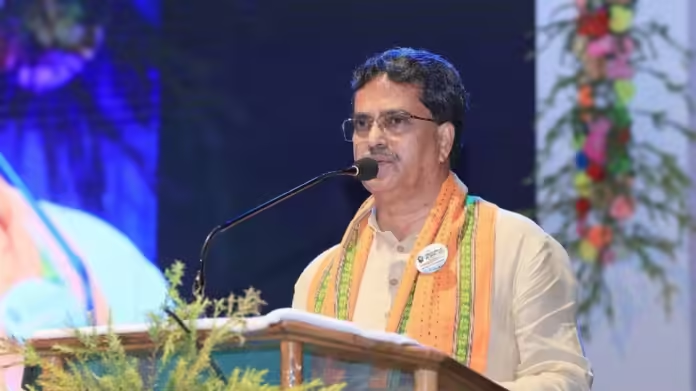Tripura Chief Minister Dr. Manik Saha praised the remarkable role of women’s Self Help Groups (SHGs) in promoting cleanliness across the state. Speaking at the closing ceremony of the “Swachhata Hi Seva” campaign on Tuesday, held at Rabindra Bhavan, the Chief Minister lauded the dedication and contribution of these groups in helping to improve sanitation and hygiene in both rural and urban areas of Tripura. His words of appreciation highlighted the crucial role these women play in the community’s well-being and the state’s overall cleanliness efforts.
During the event, Dr. Saha emphasized how the involvement of women’s SHGs in sanitation initiatives has brought about significant changes in public behavior and cleanliness practices. He pointed out that their work has gone beyond mere participation and has created a lasting impact on society, particularly in spreading awareness about the importance of cleanliness. The Chief Minister acknowledged that the success of the “Swachhata Hi Seva” campaign could not have been possible without the tireless efforts of these women, who have dedicated themselves to improving living conditions in their communities.
The “Swachhata Hi Seva” campaign, which aims to inspire citizens to actively participate in maintaining cleanliness, has gained momentum in Tripura with strong support from the government and local communities. Dr. Saha noted that women’s SHGs have been at the forefront of this movement, mobilizing resources and coordinating activities that promote cleanliness and hygiene at the grassroots level. He commended their ability to organize and educate people, making cleanliness a priority for every household and ensuring that these efforts lead to long-term benefits for the state.
In his speech, Dr. Saha highlighted specific initiatives undertaken by women SHGs, such as waste management and sanitation drives in various districts. Their involvement in ensuring proper disposal of waste and encouraging the use of clean water and toilets has helped reduce the spread of diseases and improve public health. He praised the determination of these women, whose leadership in maintaining public spaces and residential areas has made a visible difference in Tripura’s cleanliness standards.
The Chief Minister also touched upon the importance of community engagement in making any cleanliness drive successful. He acknowledged that while government initiatives are crucial, the participation of citizens, especially women, is the driving force behind sustainable change. Dr. Saha urged the public to continue supporting the work of these SHGs and to take inspiration from their commitment to creating cleaner environments. He encouraged more citizens to join hands with the SHGs in future campaigns to ensure that Tripura remains a model of cleanliness for other states to follow.
Apart from cleanliness, Dr. Saha pointed out that the involvement of women’s SHGs has also empowered them economically and socially. By participating in these campaigns, many women have gained new skills, leadership opportunities, and a stronger sense of identity within their communities. The Chief Minister remarked that the Swachhata movement has not only benefited public health but has also uplifted the status of women in Tripura, creating a platform for them to contribute actively to society’s development.
Throughout the ceremony, the role of women SHGs was repeatedly celebrated as a vital component of the state’s sanitation achievements. Dr. Saha acknowledged that Tripura’s steady progress in cleanliness and hygiene would not have been possible without the leadership of these groups, whose efforts have extended beyond just their families and impacted the entire state. He called for continued support and encouragement for these women, recognizing that their work is far from over and that their contributions will be needed in future efforts to keep the state clean and healthy.
The Chief Minister concluded his remarks by reiterating the importance of cleanliness as a shared responsibility, calling on citizens to make cleanliness a permanent habit in their daily lives. He thanked the women SHGs for their invaluable service and dedication to the cause and assured them that the government would continue to provide the necessary support to sustain their efforts. Dr. Saha’s closing remarks reflected his firm belief in the power of collective action, especially when led by the women of the state, to bring about lasting change in the fight for cleanliness.
The event at Rabindra Bhavan marked the successful conclusion of this phase of the “Swachhata Hi Seva” campaign, but it also served as a reminder that the work of ensuring a clean Tripura is ongoing. With the continued leadership of women’s SHGs and the support of the public, the vision of a cleaner, healthier Tripura is steadily becoming a reality. Dr. Saha’s heartfelt appreciation for these women highlighted the key role they play, not just in maintaining cleanliness but in building a stronger, more engaged community.


